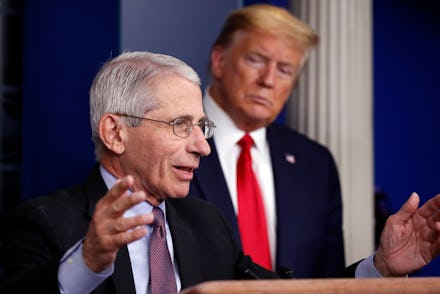Have we reached the end of Trump's coronavirus briefings?

Even as medical professionals across the country risk their lives battling coronavirus and scientists race to discover a cure, President Trump continues to flirt with pseudoscience and disinformation. Last week’s abysmal suggestion that people inject bleach to cure the virus was a new low, and the future doesn’t look very bright. According to new reports, Trump is planning to sideline the two most visible medical professionals in the White House, Dr. Anthony Fauci, the director of the National Institute of Allergy and Infectious Diseases, and Dr. Deborah Birx, a longtime diplomat and physician. In a statement given to Axios, the White House essentially confirmed the plan is to move on from the medical professionals, saying the pair won’t be leaving the administration but will “take a back seat to the forward-looking, ‘what’s next’ message.”
So far, Fauci and Birx have been making regular appearances as part of the daily White House briefings on the state of the coronavirus outbreak. They have played a crucial role in spreading useful information and guidelines, even as Trump has consistently undermined their message by encouraging people to rally against social distancing and doubting the science on the virus. The reduction in their visibility will be part of the White House’s larger plan to attempt to present positive economic news to the American public rather than grim health statistics.
Axios explained that the administration plans to push so-called “success stories” regarding businesses that have reopened post-shutdown, even as experts have had to convince the president not to encourage states to reopen too early. The messaging will also try to frame economic success as something governors need to be responsible for, as opposed to Trump. The president will simultaneously try to promote success stories during the presidential briefing, while also claiming that success is contingent on individual governors’ performance, rather than his own, as a way of dodging blame. In essence, Trump is trying to have it both ways.
The revamped briefings will also de-emphasize health statistics. In other words, Trump plans to reduce the focus on all those pesky numbers — like the one that says that more than 2,000 Americans a day have been dying from the virus in recent weeks — and replace them with rosy, cherry-picked stories of stores and restaurants opening. It’s all spin from a White House that doesn’t really know how to do anything else. Trump’s poll numbers have been falling, and the increasingly erratic press conferences aren’t helping, so his plan is to replace them with meaningless economic fanfare.
Of course, there’s also the mean questions from the nasty press: ”What is the purpose of having White House news conferences when the lamestream media asks nothing but hostile questions, and then refuses to report the truth or facts accurately,” Trump tweeted over the weekend.
While the official line is that Trump is reducing Fauci’s TV time because he wants to spread more good news, it’s hard not to suspect that there is another PR motivation lurking in the background. The president famously hates when his underlings get favorable press coverage, after all, and Fauci has become a cult hero in recent weeks thanks to his occasional willingness to correct Trump’s false messaging. Over the weekend, Saturday Night Live aired a skit in which Brad Pitt portrayed Fauci as amiably but bluntly explaining away a series of Trump’s absurd statements and unrealistic optimism about defeating coronavirus. In the skit, reacting to Trump’s claim that the virus will be cured “relatively soon,” Pitt’s Fauci equivocates:
“Relatively soon is an interesting phrase. Relative to the entire history of Earth? Sure, the vaccine is going to come real fast. But if you were going to tell a friend, ‘I’ll be over relatively soon, ’ and then showed up a year and a half later, well, your friend may be relatively pissed off.”
Then, reacting to a clip of Trump claiming that the virus will disappear just like a “miracle,” Pitt-as-Fauci says, “A miracle would be great! Who doesn’t love miracles? But miracles shouldn’t be Plan A. Even [pilot Chesley “Sully” Sullenberger] tried to land at the airport first,” he says, invoking the famous incident where Sullenberger safely landed a passenger jet on the Hudson River.
It’s a stretch to imagine that Trump is sidelining Fauci in direct response to an SNL sketch, although he is famously attuned to the show’s mockery of him. More specifically, he probably reacting to the larger notion of Fauci as a level-headed voice of reason in the White House that the show is riffing on. Trump is extremely sensitive to the optics of his administration’s constant drama and rotating cast of characters, and how that usually translates to an air on incompetence in the media. (Case in point: A blustery new Politico profile of Hope Hicks, who returned to the White House earlier this month, describes her communications strategy as “in perpetual flux, thanks largely to a mercurial president who acts on his own instincts” even as it takes a mostly flattering view of her work.)
Through no fault of Fauci’s own, his knack for articulating facts calmly and clearly has set him up as a dramatic foil to Trump’s empty, outrageous bluster. By puncturing the president’s ego, he may have doomed his role at the top of the administration’s coronavirus response team; there have been rumors that Trump’s been itching to fire Fauci for weeks now, even as he denies them. Hopefully, a face-saving move by an image-obsessed president won’t also cost thousands of American lives.